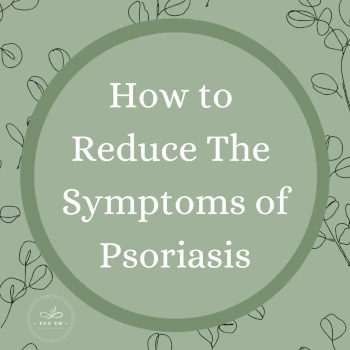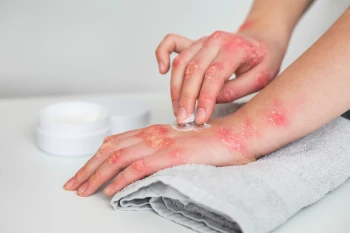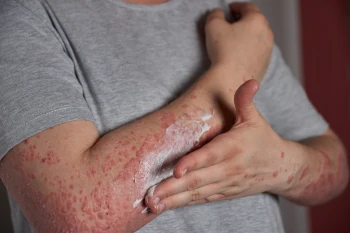Nurturing Skin Health: Psoriasis
![]()
ECO EM’S BLOG
NURTURING SKIN HEALTH: PSORIASIS
![]()
 Every week throughout October I’ll be focusing on a common skin condition. Having visited many a market and met some gorgeous people over the last couple of years, I have begun to understand how our skin is pivotal in how we feel about ourselves.
Every week throughout October I’ll be focusing on a common skin condition. Having visited many a market and met some gorgeous people over the last couple of years, I have begun to understand how our skin is pivotal in how we feel about ourselves.
It’s our biggest organ and one that covers our whole bodies. This is what can you make feel super shy and not at all confident as you battle a myriad of conditions. Some of these can be treated with a change of diet, natural remedies, and sunshine. Others are so severe, that I’ve had customers say they didn’t want to leave the house.
My hope is that with each post I help to uncover some of the common questions, and misconceptions and provide suggestions which may help in some way. If you are suffering at this moment in time, please reach out and I will do my best to see if I can help in any way.
Now onto this week’s post which focuses on psoriasis….
UNDERSTANDING PSORIASIS:
Psoriasis is a skin condition that affects our self-esteem. It reminds us of the importance of our skin, our greatest organ, which frequently determines our level of confidence. This condition can be managed in a variety of ways, ranging from dietary adjustments to natural therapies. In this post, we hope to answer common questions, dispel myths, and offer solutions to make your psoriasis journey easier.
WHAT IS THE BEST TREATMENT FOR PSORIASIS?
 Psoriasis treatment is as varied as the people who suffer from it. There is no single “best” treatment because effectiveness is typically determined by the type and severity of psoriasis, as well as individual preferences and needs. Topical creams, phototherapy (light therapy), systemic drugs, and lifestyle changes are all typical treatment strategies. A consultation with a doctor is required to identify the best treatment strategy for your specific needs.
Psoriasis treatment is as varied as the people who suffer from it. There is no single “best” treatment because effectiveness is typically determined by the type and severity of psoriasis, as well as individual preferences and needs. Topical creams, phototherapy (light therapy), systemic drugs, and lifestyle changes are all typical treatment strategies. A consultation with a doctor is required to identify the best treatment strategy for your specific needs.
WHAT CLEARS PSORIASIS FAST?
While there is no cure for psoriasis, some therapies can bring relief faster than others. Topical steroids can typically provide quick relief for localised flare-ups. Under medical supervision, phototherapy sessions might potentially provide noticeable results. The rate of clearance, however, varies, and it’s critical to follow your doctor’s instructions for safety and efficacy.
WHAT FOODS SHOULD YOU AVOID?
 Diet plays a fascinating role in psoriasis management. While there is no one-size-fits-all diet, some people find relief by avoiding specific foods. Alcohol, processed foods heavy in sugar and trans fats, and gluten-containing foods are all common triggers. Furthermore, nightshade foods such as tomatoes, peppers, and aubergine contain a chemical that has been linked to inflammation in some people and may be worth reducing. Dietary responses, on the other hand, can be highly individual, so working with a nutritionist or dietitian can help discover your particular triggers and establish a personalised eating plan.
Diet plays a fascinating role in psoriasis management. While there is no one-size-fits-all diet, some people find relief by avoiding specific foods. Alcohol, processed foods heavy in sugar and trans fats, and gluten-containing foods are all common triggers. Furthermore, nightshade foods such as tomatoes, peppers, and aubergine contain a chemical that has been linked to inflammation in some people and may be worth reducing. Dietary responses, on the other hand, can be highly individual, so working with a nutritionist or dietitian can help discover your particular triggers and establish a personalised eating plan.
WHAT IS THE ROOT CAUSE OF PSORIASIS?
The underlying cause of psoriasis remains unknown. According to new research, psoriasis is caused by a complex interaction of genetic and environmental variables. Specific genes increase susceptibility, which plays a vital role. External stimuli such as infections, stress, and skin injury are frequent triggers as well This combination means it’s even harder to pinpoint triggers and causes.
TRIGGERS AND MANAGING THEM:
Psoriasis is exacerbated by stress, and stress management practises can help alleviate symptoms. You can experiment with meditation, yoga, and mindfulness throughout the day to see if they help you feel better.
Sunlight exposure can be beneficial, but it is important to exercise caution to avoid overexposure. And using the proper sun cream to avoid further irritation to the skin.
It is critical to keep the skin moisturised to avoid flare-ups produced by dry skin. This can aid in the healing of broken skin and the prevention of infection. The Body Lotion Bar has been used by several customers who have all left positive reviews.
Smoking and food are two lifestyle variables that can influence the severity of psoriasis, and making good choices can help. There have been multiple occasions where customers have opted for more fruit, vegetables, and fibre in their diet. Aiming for a whole-food diet, and have said it has helped with their symptoms tremendously.
There is no single path to wellness, but by seeking the advice of a doctor, exploring treatments with patience, considering dietary options, and understanding our genetics and environment, we can navigate towards a life of greater comfort and confidence, even when psoriasis is present.
Remember that your path is unique, and you are not alone in your search for skin wellness. We can explore, learn, and thrive together, don’t hesitate to get in touch if you have any questions I may not have covered in this article.
Thank you for reading this weeks blog, Nurturing Skin Health: Psoriasis.
Peace and love,
Eco Em xx
